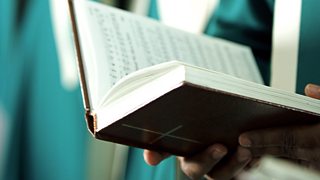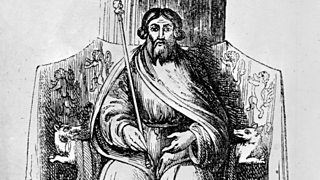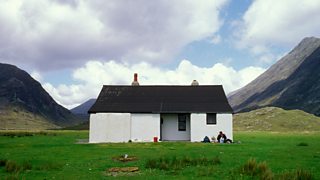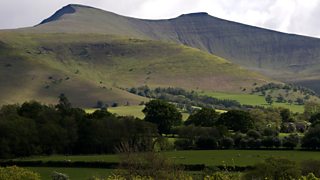St David's Big Life Hack
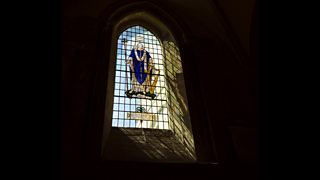
As we mark another St David's Day (1 March), what do we know about the Welsh saint, and what can we learn from the life of a man who told the monks who followed him to "sweat the small stuff"?
St David really existed – he was at the heart of the Welsh church in the 6th century. He had pedigree – a scion of an aristocratic family in West Wales, his mother became a saint (Saint Non); his teacher was also a saint, St Paulinus.
David was one of the early saints who helped to spread Christianity among the pagan Celtic tribes of Western Britain, founding a large monastery in West Wales; he became Archbishop of Wales, but remained in his community at Menevia (now called St Davids).
His shrine became a great place of pilgrimage – four visits to the shrine at St David's were considered the equivalent of two to Rome, and one to Jerusalem!
So... St David was a real person?
Yes. Most information about St David comes from a biography written by Rhygyfarch in the 11th century. Because it was written so long after the saint's death, it isn't likely to be very reliable. Furthermore, Rhygyfarch was a bit of a spin-doctor, and slanted his book to make the case for the Welsh church being independent of Canterbury. One writer describes Rhygyfarch's book as "chiefly a tissue of inventions". Nonetheless, David's life is suffused with legends and miracles.
Lightning and sea monsters – the legends and miracles of St David
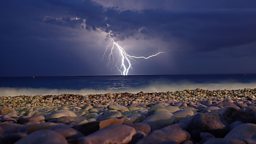
The first legend is set 30 years before David was born when an angel foretold his birth to St Patrick. David's father was a prince called Sant, son of the King of Cardigan; his mother Non was the daughter of a local chieftain (and possibly the niece of King Arthur).

We can transform our domestic, our family relationships, our national life.Dr Rowan Williams
But David wasn't the child of a love-filled marriage – he was born after his father either seduced or raped Non, who went on to become a nun. Non left her family and gave birth by the sea. So intense was the birth that her fingers left marks where she grasped the rocks. As David was born, a bolt of lightning from heaven struck the rock and split it in two.
St David was baptised by St Elvis of Munster, and it is said that a blind man was miraculously cured by the water used for the baptism. David was schooled at the local monastery, Hen Fynyw, which is south of present day Aberaeron, and was taught by Paulinus, a blind monk. David cured Paulinus of his blindness by making the sign of the cross. Realising that David was a special and holy person, Paulinus sent him off as a missionary to convert the pagan people of Britain.
In the course of his travels, David is said to have founded 12 monasteries. At one of them, David became so unpopular with his monks for the life of austerity he made them live, that they tried to poison him. David was warned about this by St Scuthyn, who travelled from Ireland on the back of a sea-monster for the purpose. David blessed the poisoned bread and ate it; he came to no harm.
The hills are alive...
The most famous story about David tells how he was preaching to a huge crowd and the ground is said to have risen up, so that he was standing on a hill and everyone had a better chance of hearing him. One Welsh historian commented that, "One can scarcely conceive of any miracle more superfluous" in that part of Wales than the creation of a new hill!
David believed that monks should live simply, and he prescribed a harsh life for his followers. They were expected to remain silent, except for prayer or in emergency. As well as praying and celebrating Mass, the brothers had to work hard, rising at dawn for prayer, and then working in the monastery and the fields around it. David would not allow them to make animals work for them, but made them pull the plough themselves, saying, "Every man his own ox."
The monks endured a meagre diet, restricted to vegetables and bread, with milk and water to drink. St David himself drank only water, and is sometimes known in Welsh as "Dewi Ddyfrwr" (David the water drinker).
St David's Big Life Hack
But though it was a hard life, David's holiness and personal charisma were enough to hold the community together. The example of his life, and the modernity of his most famous saying (from his last sermon) – that we should concentrate on "doing the little things in God's presence with conscientiousness and devotion" – make St David a figure with a contemporary appeal.
Former Archbishop Dr Rowan Williams thinks that phrase resonates with modern people because "...it reminds us that the primary things for us are the relationships around us, the need to work at what's under our hands, what's within our reach.
"We can transform our domestic, our family relationships, our national life to some extent, if we do that with focus and concentration in the presence of God."
-
![]()
The Daily Service
Reflection, a reading, and music for St David's Day.
-
![]()
In Our Time: Owain Glyndwr
Melvyn Bragg and guests discuss the man behind a major revolt against England, from 1400-1412.
-
![]()
How difficult is it to live in a remote area?
Dan Richards trekked to high mountain huts and distant snowy cabins to found inspiration in the wilderness.
-
![]()
Soul Music: Myfanwy
Cerys Matthews explores the impact of the hauntingly beautiful Welsh song of unrequited love.
